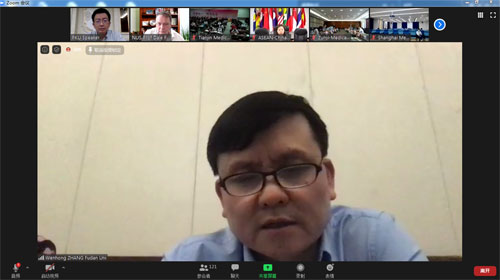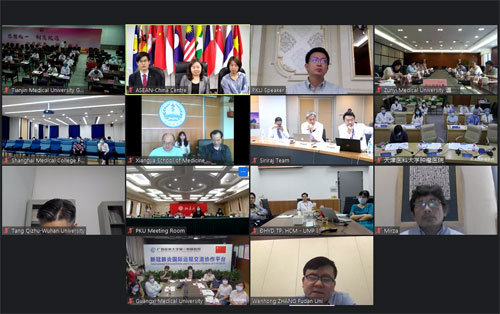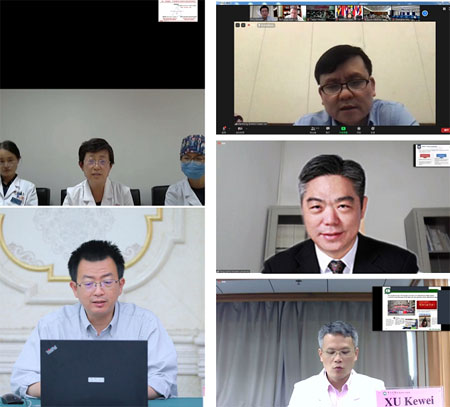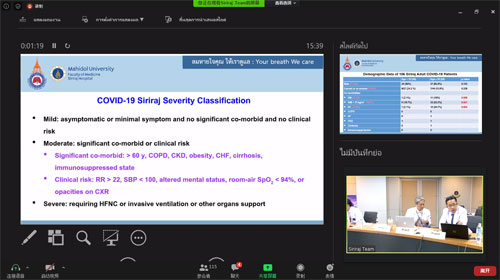On the afternoon of 19 May 2020, the Online Conference for Experience Sharing on COVID-19 Response by ASEAN-China University Consortium on Medicine and Health was successfully held. The conference was co-hosted by the ASEAN-China Centre (ACC), Peking University and Mahidol University of Thailand.
Mr. Fang Jun, Deputy Director-General of Department of International Cooperation and Exchanges of the Ministry of Education of China, Mr. Chen Dehai, Secretary-General of ACC, Prof. Zhan Qimin, Executive Vice President of Peking University and President of Peking University Health Science Centre (PKUHSC) and Prof. Prasit Watanapa, Dean of Faculty of Medicine/ Siriraj Hospital of Mahidol University attended the conference via video link and addressed the opening. With the theme of “diagnosis and treatment protocol, prevention and control of COVID-19”, the conference saw attendance of over 200 medical experts from 18 universities of China, including Peking University, Fudan University, Wuhan University and Sun Yat-sen University, as well as 22 universities of ASEAN countries, including Universitas Indonesia, University of Malaya and National University of Singapore.

Deputy Director-General Fang Jun congratulated the conference on its successful convening on behalf of the Ministry of Education of China. He said that the COVID-19 pandemic is yet another global challenge that teaches us that our world is one community with a shared future, and that only through cooperation, solidarity and mutual assistance can we secure a win in our anti-epidemic battle. He proposed to establish an epidemic prevention and control mechanism for China and ASEAN, and counteract the negative impact through concrete actions in the spirit of openness and cooperation, thus maintaining public health security for the region and beyond.

ACC Secretary-General Chen Dehai said that since the outbreak of COVID-19, as good neighbors and friends, ASEAN and China have joined hands in fighting against this deadly virus through mutual support and assistance, which fully embodies the strategic significance of ASEAN-China relations. Chinese President Xi Jinping stressed in his speech at the 73rd Session of the World Health Assembly that the most urgent task is to make all-out efforts in COVID-19 control and treatment. It is necessary to step up information sharing, exchange experience and best practices, and pursue international cooperation on testing methods, clinical treatment, and vaccine and medicine research and development. That is why this timely and meaningful event is held with inputs from all relevant parties.

Prof. Prasit Watanapa said that virus respects no borders given the background of globalization. To share anti-epidemic experience and promote mutual learning between ASEAN countries and China is of great significance in contributing to the international cooperation in battling this pandemic within the region.
Prof. Zhan Qimin said that since human beings share a common destiny, universities from different countries should all leverage their role as think-tanks, and assist governments all over the world in their response to this pandemic. He hoped that the ASEAN-China University Consortium on Medicine and Health would stay true to its founding mission, fully play its role as a platform by strengthening academic exchanges and cooperation, bringing all relevant parties in the joint response to the public health crisis in the region and around the globe.


During the conference, Prof. Qiao Jie, Executive Vice President of PKUHSC and President of Peking University Third Hospital, Prof. Zhang Wenhong, Director of Infectious Diseases Department, Huashan Hospital Affiliated to Fudan University, Prof. Tang Qizhu, Vice President of Wuhan University, Prof. Xu Kewei, Vice President of Sun Yat-sen Memorial Hospital, Assoc. Prof. Nithipatana Chierakul, President of Thoracic Society of Thailand, Dr. Ari Fahrial Syam, Dean of Faculty of Medicine, Universitas Indonesia, Prof. Dato Adeeba Kamarulzaman, Dean of Faculty of Medicine, University of Malaya and Prof. Dale Fisher, Yong Loo Lin School of Medicine, National University of Singapore and National Chair of Infection Prevention and Control, Ministry of Health of Singapore shared their experience and practices in fighting COVID-19, with topics covering a wide range including the role of universities in battling the novel coronavirus pandemic, prevention and control of its spread, treatment and diagnosis of severe cases, handling of common clinical problems and control of hospital transmission.

Medical experts from various countries also had in-depth and practical exchanges on issues of common interest in a warm atmosphere. All parties believed that this online activity is timely, professional and successful. They hoped that universities of both sides would continue to carry out practical exchanges on epidemic diagnosis and control, vaccine and drug research and development, as well as talent cultivation, so as to further promote ASEAN-China cooperation in the fight against the pandemic and make positive contributions to the maintenance of public health security in the region and beyond.


Supported by ACC and led by PKUHSC, the ASEAN-China University Consortium on Medicine and Health was established in October 2019 in order to actively promote medical cooperation between ASEAN countries and China. The Consortium aims to strengthen in-depth exchanges and collaboration among medical universities and institutions of ASEAN countries and China in the fields of medical education, research and healthcare, promote common development of medical education and research for the region, improve medical talent cultivation and healthcare services, and make positive contributions to the improvement of the people’s health in the region and to the development of medicine and health causes of the world.












